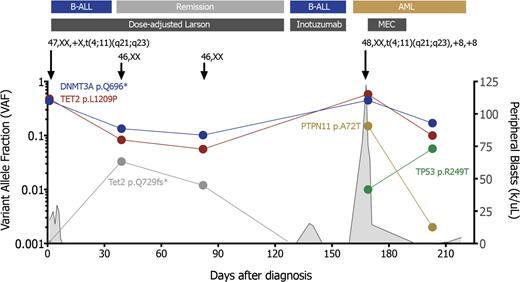Abstract
Background: Immunologic therapies targeting lineage-specific antigens such as CD22 and CD19 can improve outcome in patients with B cell acute lymphoblastic leukemia (B-ALL). The presence of mixed lineage leukemia (MLL) gene rearrangements highlights a subset of B-ALL patients with increased risk of treatment failure after inotuzumab ozogamicin (INO), an anti-CD22 antibody-drug conjugate. In some MLL-rearranged cases, a switch of hematopoietic lineage from B-ALL to acute myeloid leukemia (AML), has been associated with resistance to lymphoid-targeted therapies. In AML, founder clones harboring mutations associated with clonal hematopoiesis of indeterminate potential (CHIP) can persist during remission as reservoirs of treatment resistance. We therefore hypothesized that B-ALL can arise in the setting of a founding CHIP clone and undergo lineage switch under the selection pressure of B cell restricted therapy.
Case Description: A 65-year-old female presented with two weeks of easy bruising, fatigue, and 54% circulating blasts. Flow cytometry was consistent with B-ALL that was positive for CD19, CD22, and aberrant CD15. Cytogenetics confirmed the presence of a t(4;11) (q21;q23) MLL rearrangement. The patient received intensive induction with dose-adjusted Larson regimen and morphologic complete remission was confirmed on Day 36. No residual disease was detectable by multiparametric flow cytometry. During consolidation (Day 136), a relapse of CD19+ CD22+ B-ALL was observed in the blood and marrow and treatment with INO was initiated. Despite rapid initial clearance of circulating disease, peripheral blasts were again observed on Day 167. At this time, flow cytometry demonstrated myeloblasts (positive for CD13, CD33, and CD117, but negative for CD19 and CD22), with no evidence of the previous lymphoblast population. The AML was refractory to multiagent salvage chemotherapy.
Results: We evaluated the lineage-specificity and clonal dynamics of somatic genetic alterations using targeted gene panel sequencing at 5 timepoints during the course of treatment, compared to results from cytogenetic analysis and flow cytometry. At the time of initial diagnostic evaluation, we identified somatic mutations in DNMT3A (p.Q696*) and TET2 (p.L1209P). Variant allele fractions (VAFs) were 44% and 48%, respectively, suggesting they were both present at high abundance in the leukemic clone.
TET2 and DNMT3A mutations are most commonly found in individuals with myeloid neoplasms and CHIP and are not frequently observed in those with B-ALL. We therefore asked whether these mutations preceded the MLL rearrangement in the leukemia clonal hierarchy by comparing their abundance at diagnosis to their abundance during MRD-negative clinical remission. We observed persistence of the DNMT3A (VAF = 13% and 10%) and TET2 (VAF = 8% and 6%) mutations during remission (Day 39, Day 82), while the MLL rearrangement was undetectable at both remission timepoints.
We next evaluated the clonal relationship between the myeloid relapse after INO treatment and the initial B-ALL. In the AML phase, we again observed DNMT3A and TET2 mutations at high VAFs (>40%), as well as a PTPN11 p.A72T mutation (VAF 15%) and tetrasomy 8 that were undetectable at prior timepoints. A new TP53 p.R249T mutation was detected at the time of clinical progression after salvage chemotherapy, despite clearance of the PTPN11 mutated subclone. Cytogenetic analysis at diagnosis, first relapse, and second relapse confirmed MLL rearrangement t(4;11)(q21;q23).
Conclusion: These results provide molecular evidence that primordial founder clones may persist during clinical remissions in MLL-rearranged leukemia and enable lineage switching upon relapse. More broadly, this case suggests that somatic mutations found in CHIP and other potentially pre-neoplastic states could confer increased risk of clonal escape from lineage-restricted therapies.
No relevant conflicts of interest to declare.
Author notes
Asterisk with author names denotes non-ASH members.


This feature is available to Subscribers Only
Sign In or Create an Account Close Modal